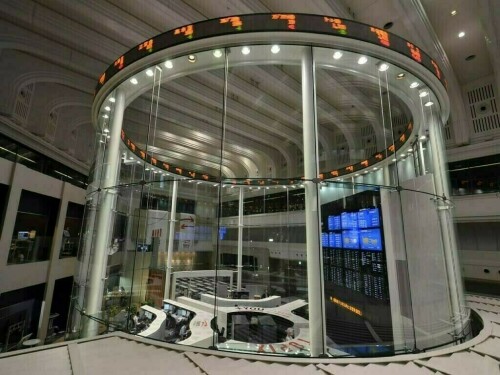Nikkei Declines as Yen Strengthens; Investors Await US-Japan Talks
TOKYO: Japan’s Nikkei average experienced a decline on Monday as a stronger yen placed pressure on exporting companies. Market participants are also awaiting indications regarding the currency’s future direction from upcoming discussions between financial leaders of Japan and the United States this week.
As of 0211 GMT, the Nikkei was trading down by 1%, registering at 34,385.26. The broader Topix index also decreased, falling by 1.02% to reach 2,533.15.
According to Shuutarou Yasuda, a market analyst at Tokai Tokyo Intelligence Laboratory, investors engaged in stock repurchases as the Nikkei’s losses deepened during the session; however, this buy-back activity proved to be short-lived.
Yasuda added, “The current situation differs from earlier this month when any decline in the index triggered further sell-offs. The market is not yet prepared to fully embrace a risk-on approach.”
The yen has appreciated to a seven-month peak against the dollar, influenced by wavering confidence in U.S. assets, a situation intensified by President Trump’s criticism of the Federal Reserve.
A stronger yen typically impacts exporters negatively by diminishing the yen value of overseas profits when these earnings are repatriated to Japan.
Automakers faced declines, with Toyota Motor decreasing by 2.24% and Honda Motor falling by 0.72%. Suzuki Motor also experienced a loss of 4%. Finance Minister Katsunobu Kato and Treasury Secretary Scott Bessent are scheduled to convene this week.
Prime Minister Shigeru Ishiba stated on Sunday that Japan intends to emphasize fairness in any discussions with the U.S. concerning exchange rates.
Trump has expressed his desire for negotiations to address his claims that Tokyo deliberately weakens its currency to provide an unfair advantage to its exporters.
Shares of companies supported by domestic demand saw increases, with the railway sector gaining 0.31%, making it the best-performing sector among the Tokyo Stock Exchange’s 33 sub-indexes.
The retail sector edged up by 0.06%. Declines were seen in all but four of the sub-indexes.
Nitori Holdings, a retailer of home interior goods that relies heavily on imports, increased by 3%, providing the most significant support to the Nikkei.



Comments (0)
No comments yet. Be the first to comment!
Leave a Comment